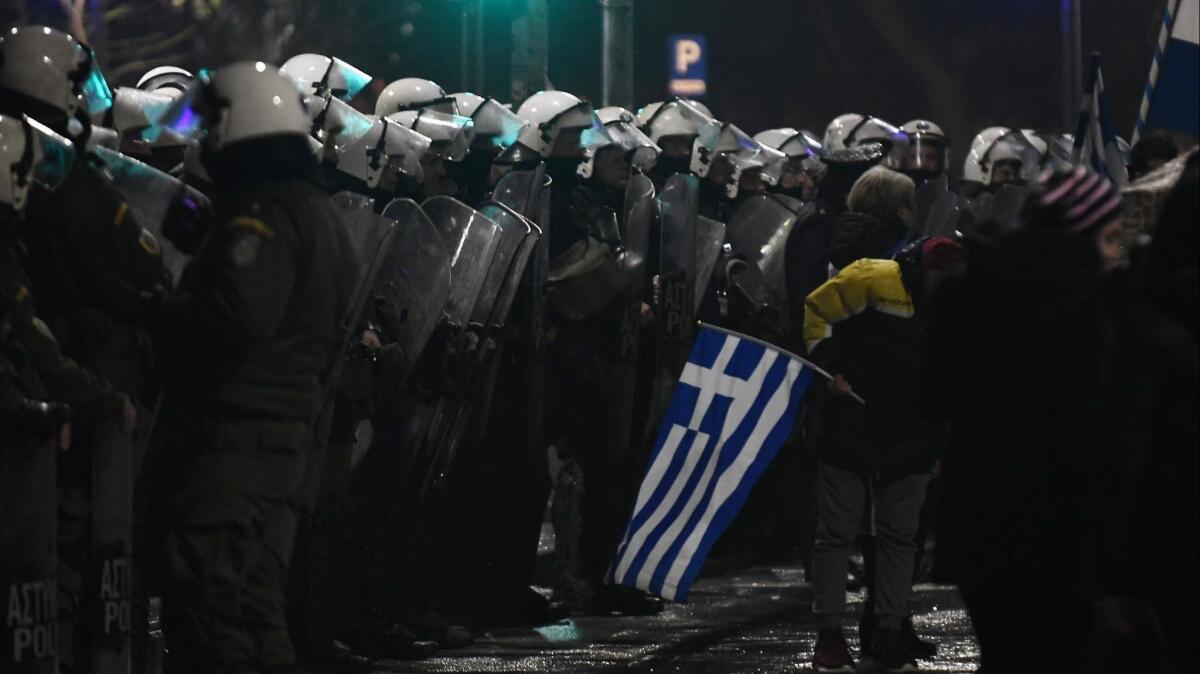Greece’s tussle with Macedonia over name threatens future of government in Athens

- Share via
Reporting from Athens — The future of the Greek government was thrown into question Sunday after the defense minister announced he was quitting and withdrawing his party from the ruling coalition to protest a pending agreement with neighboring Macedonia over its name.
Last June, Greece agreed to drop its opposition to the Republic of Macedonia joining NATO and the European Union if Macedonia changed its name to “the Republic of North Macedonia.”
The defense minister, Panos Kammenos, the leader of the Independent Greeks party, argues that any new name should eliminate the word “Macedonia,” a view that reflects popular opinion in Greece, which has a region called Macedonia.
His party holds just seven of the 300 seats in Parliament, but its alliance with Prime Minister Alexis Tsipras’ party, Syriza, which holds 145 seats, has made it a crucial part of the coalition that has governed Greece for the last four years.
Tsipras said Sunday that he had asked Parliament to hold a vote of confidence, which will probably take place on Tuesday and Wednesday.
“We will immediately move to the process outlined by the constitution for the renewal of the confidence in my government,” Tsipras said after meeting with Kammenos in Athens. “We have critical legislative work and interventions to do.”
His government said it is confident that some members of Kammenos’ party will continue to offer their support and help it win the 151 votes it needs to serve out its term, which ends in October. A vote of no-confidence would almost certainly force earlier elections.
The dispute over the name began in earnest in 1991, when the Republic of Macedonia emerged from the collapse of Yugoslavia.
It sparked an immediate crisis. The Greek prime minister at that time fired his foreign minister, who went on to form his own party, which attracted enough defectors from the prime minister’s party to play a major role in bringing down his government.
The region of Macedonia in Greece includes Thessaloniki, the nation’s second-biggest city and one of its largest ports.
Compounding the insult, the new republic renamed its main airport “Alexander the Great” in 2006, a move seen by Greeks as claiming the heritage of the ancient Greek king, who hailed from the ancient region of Macedonia and set out from there to conquer the known world. The name was dropped last year in a goodwill gesture.
The agreement hashed out last summer on the shores of Lake Prespa, which spans the border between Greece and the Republic of Macedonia, received support from the U.S. and much of Europe, which saw it as a way to stem Russian influence in the region.
The agreement “will benefit North Macedonia, Greece and the European Union,” German Chancellor Angela Merkel said last week on her first visit to Athens in four years. “I am deeply convinced of this.”
The new name would be used both internationally and bilaterally, so that the countries that recognize Macedonia would have to change their recognition to North Macedonia.
But ratifying the accord has not gone smoothly.
In Greece, thousands of protesters rallied against it in Athens and Thessaloniki, chanting that there was only one Macedonia and that it was Greek.
In the Republic of Macedonia, participants in a nonbinding referendum overwhelmingly favored the name change, but turnout fell far short of the 50% needed to approve it. Among the opponents is the president, Gjorge Ivanov, who has said the agreement violates the country’s sovereignty.
That didn’t stop Prime Minister Zoran Zaev from scraping together a majority of lawmakers last week to approve changing the constitution to rename Macedonia.
Now the issue depends on Greece, where the Parliament must approve the agreement. Tsipras said that he expects a vote to be held by the end of the month, and his government believes it has the 151 votes needed to pass it.
Even before the political developments Sunday, another mass rally was planned in Athens on Jan. 20 to oppose the accord.
For his part, Tsipras has said getting the agreement through Parliament will be his most important achievement after ending a series of financial bailouts that have kept Greece in the Eurozone at the cost of pension and wage cuts and higher taxes.
“It is a burden on our foreign policy,” he said in a television interview last week. “There is no reason for us to have this open front with our neighbor.”
Petrakis is a special correspondent.
More to Read
Sign up for Essential California
The most important California stories and recommendations in your inbox every morning.
You may occasionally receive promotional content from the Los Angeles Times.











